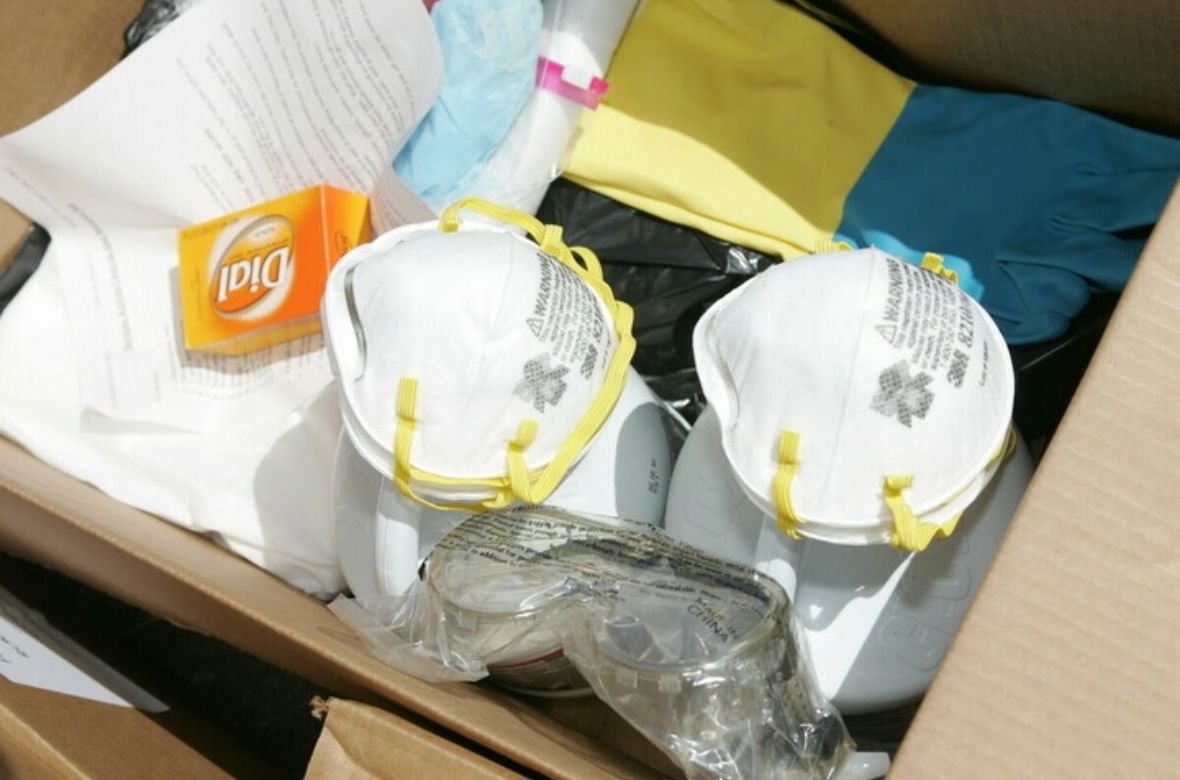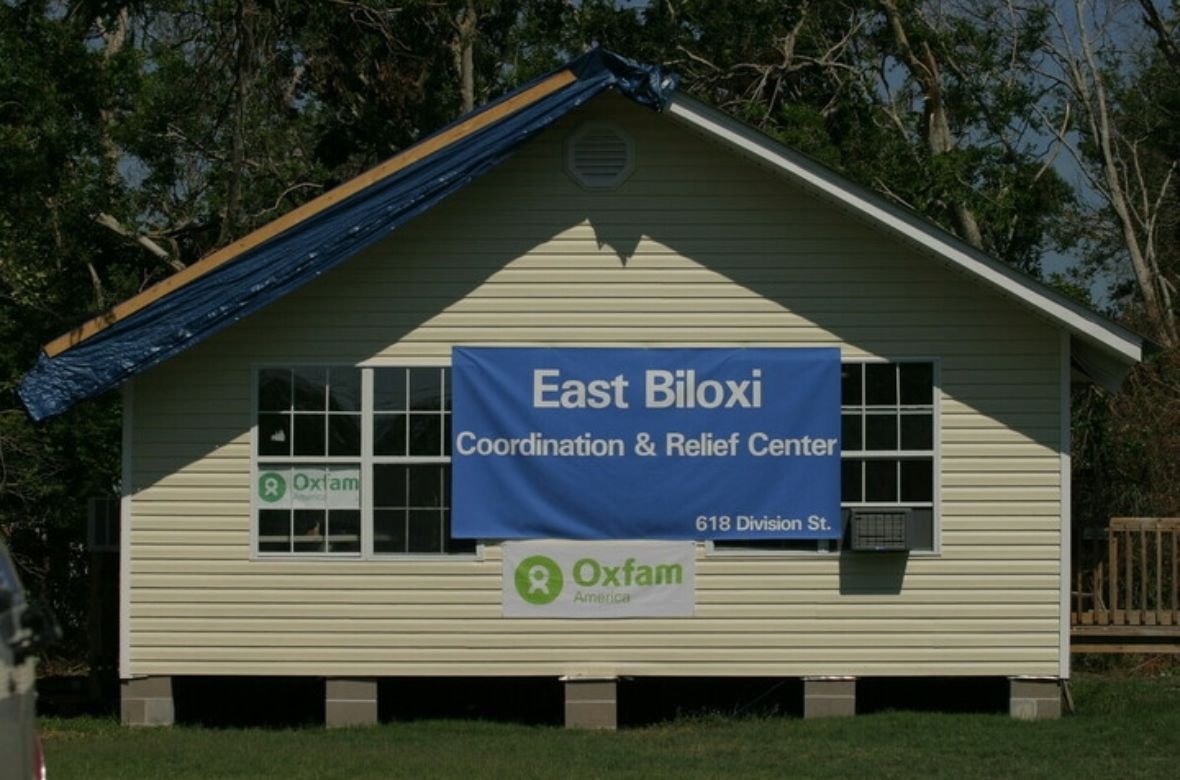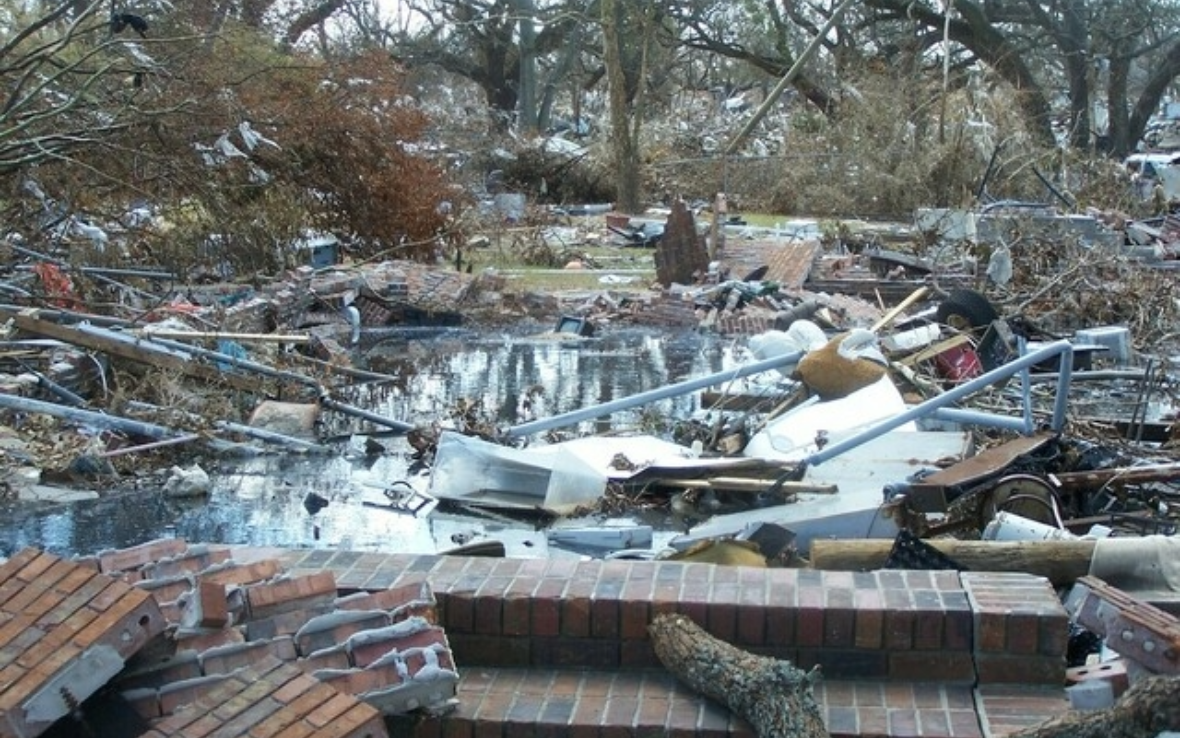Twenty years after Hurricane Katrina transformed Oxfam’s approach to domestic operations, we continue to uplift communities in the South.
When Hurricane Katrina made landfall on August 29, 2005, it changed the Gulf Coast and the way Oxfam operates forever with many firsts, including our first major humanitarian response. “Katrina was like a cancer,” said Telley Madina, a Louisiana resident and Oxfam’s former senior Gulf Coast policy officer. “It isn't necessarily that cancer will kill you, but cancer will amplify all the other bad stuff in your body. Katrina put a great deal of strain on an already terrible infrastructure.”
Like so many of you, we watched in horror as the government failed to respond in the aftermath of the storm. “We were watching the footage of people clamoring on their roofs, holding on to their chimneys, and it was so apparent that these folks, mainly Black folks, had been abandoned,” recalls Minor Sinclair, the former head of Oxfam’s domestic program. “[Before Katrina] we didn’t do disaster relief in the U.S., because we only respond when the local state systems collapse and the U.S. has funds for disaster relief that should be adequate.”
Oxfam staff went down to the region to help out with immediate aid efforts. Upon arrival, they took part in water distribution and began reaching out to local leaders to find out how they could help. Vice President Strategy & Operations Ashley Tsongas, who served as Gulf Coast policy advisor on post-Katrina work, remembered: “They just went down [to Biloxi] to help, and it was just so clear there was no response in these less visible communities.”
Though we had never before launched a full domestic humanitarian response, Oxfam had been operating in the South since the ‘90s, working in large part with minority farmers. We already had connections in rural areas, and what we lacked in logistics, Oxfam made up for in “reputation, ambition, and mission,” said Sinclair.
Within the week, Oxfam’s team was assessing the situation to determine where we could have the most impact. Our team was one of the first from a private aid group to reach two inaccessible parishes in southern Louisiana—St. Bernard and Plaquemines—where destruction was nearly complete in some areas. In southern Louisiana, we had public health experts examine the impact environmental contamination could have on returning residents. We also helped assemble cleanup and recovery kits that included hazardous material suits for homeowners.
We launched the Hurricane Katrina Response and Recovery Fund to channel money to communities and worked with partners to establish a recovery plan for returning residents. In total, we supported 23 partners through our Gulf Coast Equitable Recovery Program.
While media attention was focused on New Orleans, Oxfam targeted coastal areas in southern Mississippi and Louisiana where people experiencing poverty had been left behind. FEMA had set up a Disaster Recovery Center in West Biloxi, Mississippi, a predominantly white area not badly affected by the storm, where people could submit claims. Without cars or any functioning public transportation, people in affected East Biloxi faced barriers to apply for aid. Oxfam brought East Biloxi city councilman Bill Stallworth—the only Black council member—to testify before the U.S. Homeland Affairs Committee about the lack of access to aid people in his district were experiencing. This was a major turning point in our advocacy for community empowerment.

Building local networks
Our first partnership was with the National Association for the Advancement of Colored People (NAACP), which was leading a caravan of aid to East Biloxi. We supported the effort, and from there, the program grew.
We also backed Stallworth with the establishment of the East Biloxi Coordination and Relief Center. The focus of the work in East Biloxi quickly evolved from distribution of goods to salvaging and rehabilitating houses. Within a couple of weeks, volunteers had surveyed all of East Biloxi, and had drawn up a map indicating the houses that could be salvaged. The Coordination and Relief Center would go on to became a one-stop-shop for the community, assisting with each step of case management in rebuilding homes.
Oxfam gave a grant to the Mississippi Association of Cooperatives (MAC) to assist African American farmers with rebuilding, and we helped supply residents with food in the aftermath of markets being shut down. Oxfam and MAC also assisted farmers with their FEMA and Small Business Administration applications.
“Oxfam and Kellogg [the W.K. Kellogg Foundation, which funded Oxfam’s post-Katrina work] stepped up with private money,” said Ben Burkett, state coordinator for MAC. “They didn't just hit and run; they stayed for the long haul.”
Prior to Katrina, there were 52 members in the cooperative. With their crops destroyed, many farmers decided to cut their losses and retire. Oxfam worked with MAC with an eye to long-term sustainability. Two new cooperatives formed in Mississippi and Louisiana. The cooperatives went on to increase their capacity, expand operations, and increase the number of local and regional markets they supplied. Oxfam still works with MAC today.

Oxfam’s Katrina response ended up being a five-year program and it was completely partner-led. In many cases, as with the East Biloxi Coordination and Relief Center, we were supporting community leaders who were coming together to form organizations. In the second half of our response, we worked with immigrant groups because a large part of the reconstruction efforts were shouldered by immigrants. Another newly formed group we helped support was the Mississippi Immigrants Rights Alliance, which used a recreational vehicle to contact the state's approximately 130,000 Latino residents about services available to them.
Fostering resilience in the South
We were transitioning to the next phase of our post-Katrina response Gulf Coast work, supporting coastal community resilience, when the BP oil spill happened in 2010. The environmental disaster had devastating impacts on people who fished for a living. This time around, we weren’t just in the right place at the right time, but we had a playbook for the response. “We now had a network of organizations that knew each other, knew how to work together, and trusted each other and had the capacity to understand both the disaster elements but also the rebuilding,” said Sinclair.
We worked with partners in Louisiana and Mississippi to establish workforce development programs to help people who had lost their livelihoods pivot their careers and achieve economic security. We brought the Rev. Tyrone Edwards, executive director of Oxfam’s partner organization Zion Travelers Cooperative Center to the Capitol to testify about the oil spill’s the effects on coastal communities.
We were able to influence the 2012 RESTORE Act, which ensured that when BP and other companies responsible for the spill pay civil fines, the money will go directly to the Gulf Coast to restore vulnerable communities, ecosystems, local economies, and working families.
Madina described Oxfam’s coastal resilience and workforce development programming as “putting people in a position to win,” and that is something we continue to do. Oxfam is an advocate for economic stability in the South. Most notably, we have partnered with local Black women-led organizations to build a movement for change through our A New Era for Black Women initiative. We aim to secure job protections, workplace advancements, more pathways to work, and higher-paying jobs. Should another disaster strike, we want to make sure people are in the best position to move forward.
